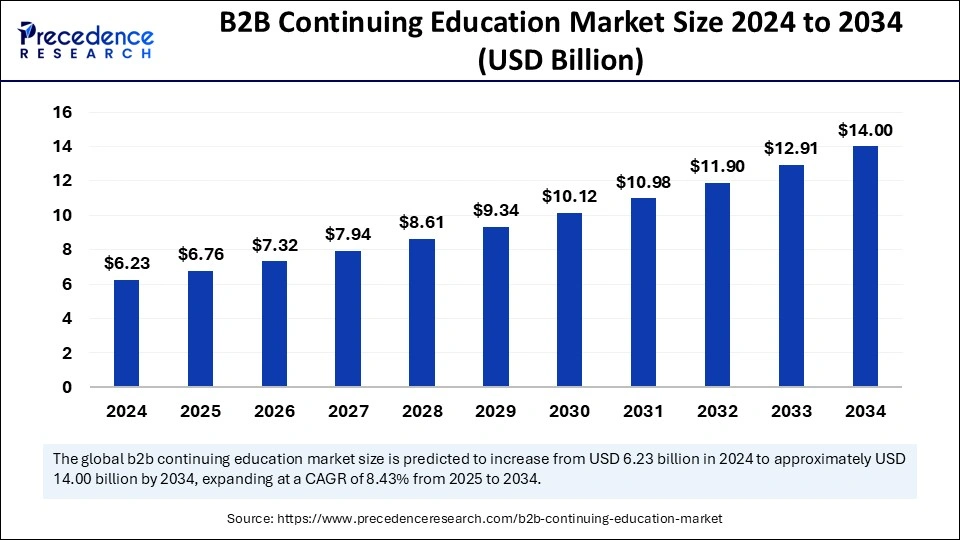The B2B continuing education market is projected to grow from USD 6.23 Bn in 2024 to USD 14.00 Bn by 2034, with a CAGR of 8.43%.

B2B Continuing Education Market Key Takeaways
-
North America led the B2B continuing education market in 2024, while Asia Pacific is projected to grow at a notable CAGR from 2025 to 2034.
-
The offline segment held the highest market share by type in 2024, whereas the online segment is expected to witness rapid growth throughout the forecast period.
-
Acute care centers dominated the application segment in 2024, while the behavioral health segment is anticipated to experience significant growth between 2025 and 2034.
-
The training segment accounted for the largest market share in 2024, with the credentialing segment poised to grow at a remarkable rate over the forecast period.
B2B Continuing Education Market Overview
B2B continuing education programs, offered through various formats such as online courses, workshops, certification programs, and webinars, provide employees with the opportunity to stay relevant in their respective fields. Enterprises are collaborating with educational institutions, e-learning platforms, and specialized training providers to develop customized learning solutions that align with their business objectives. The increasing adoption of digital learning technologies, including artificial intelligence, machine learning, and virtual reality, is transforming the B2B continuing education landscape, making it more accessible, flexible, and engaging for employees.
B2B Continuing Education Market Drivers
The primary driver of the B2B continuing education market is the growing need for skill enhancement and workforce development in a rapidly evolving business environment. Organizations are under increasing pressure to adapt to technological advancements, regulatory changes, and shifting consumer preferences, which necessitates continuous learning and upskilling. The rise of remote work and the digitalization of business processes have further accelerated the demand for online and hybrid learning solutions that offer flexibility and convenience.
Additionally, the increasing focus on employee retention and engagement is compelling organizations to invest in continuing education programs that empower employees and contribute to career advancement. The growing emphasis on compliance training and regulatory certifications in industries such as healthcare, finance, and information technology is driving the adoption of specialized training programs that ensure compliance with industry standards and regulations.
Opportunities
The B2B continuing education market presents numerous opportunities for growth, particularly in the areas of personalized learning, microlearning, and competency-based education. Organizations are increasingly seeking customized learning solutions that cater to the specific needs of their workforce, creating opportunities for e-learning providers and training institutions to offer tailored content and adaptive learning platforms.
The integration of artificial intelligence and data analytics in learning management systems is enabling organizations to personalize learning experiences, track progress, and measure the effectiveness of training programs. The rise of microlearning, which delivers short, focused learning modules, is gaining traction among organizations looking to enhance knowledge retention and improve learner engagement. Moreover, the increasing demand for industry-specific certifications and credentials is creating opportunities for training providers to develop specialized programs that address the evolving needs of various industries.
Challenges
Despite the promising growth prospects, the B2B continuing education market faces several challenges that could impact its progress. One of the primary challenges is the need to ensure content relevance and alignment with evolving industry requirements. As technology and business models continue to evolve, organizations must continually update their training content to reflect the latest trends and best practices. Ensuring employee engagement and motivation in a remote or hybrid learning environment can also be challenging, as learners may face distractions or struggle with self-paced learning formats.
Additionally, the high cost of developing and maintaining customized training programs and the need for ongoing technical support can pose financial constraints for organizations, particularly small and medium-sized enterprises.
Regional Insights
North America dominates the B2B continuing education market, driven by the presence of a large number of enterprises that prioritize employee development and the widespread adoption of digital learning technologies. The United States, in particular, is a major market, with organizations across various sectors investing in upskilling and reskilling initiatives to address the challenges posed by technological disruptions.
Europe is another significant market, with countries such as the United Kingdom, Germany, and France witnessing increased adoption of continuing education programs aimed at enhancing workforce capabilities. The Asia Pacific region is experiencing rapid growth, fueled by the expansion of multinational corporations and the growing emphasis on workforce development in emerging economies such as India and China.
Latin America and the Middle East & Africa are gradually adopting continuing education solutions, driven by increasing investments in human capital development and digital infrastructure.
Recent Developments
Recent developments in the B2B continuing education market include the adoption of artificial intelligence and machine learning in learning management systems to deliver personalized learning experiences and optimize training outcomes. Organizations are increasingly leveraging virtual reality and augmented reality technologies to create immersive learning environments that enhance employee engagement and retention.
Strategic partnerships between enterprises and educational institutions are facilitating the development of industry-specific training programs and certifications. Additionally, the growing focus on soft skills training, including leadership, communication, and emotional intelligence, is driving the expansion of continuing education offerings.
B2B Continuing Education Market Companies
- onosim Inc.
- Healthstream
- Litmos Us L.p.
- Relias Llc
- Cornerstone
- Modio Health
- Stericycle Inc.
- Intellisoft Confidential
- Silversheet
- Kenes Group
- Med Learning Group
Segments Covered in the Report
By Type
- Offline
- Online
By Component
- Training
- Credentialing
By Application
- Ambulatory Surgery Center
- Behavioral Health
- Community Health Center
- Acute Care Center
- Urgent Care Center
- Imaging and Diagnostic Center
- Others
By Geography
- North America
- Europe
- Asia-Pacific
- Latin America
- Middle East and Africa
Ready for more? Dive into the full experience on our website!